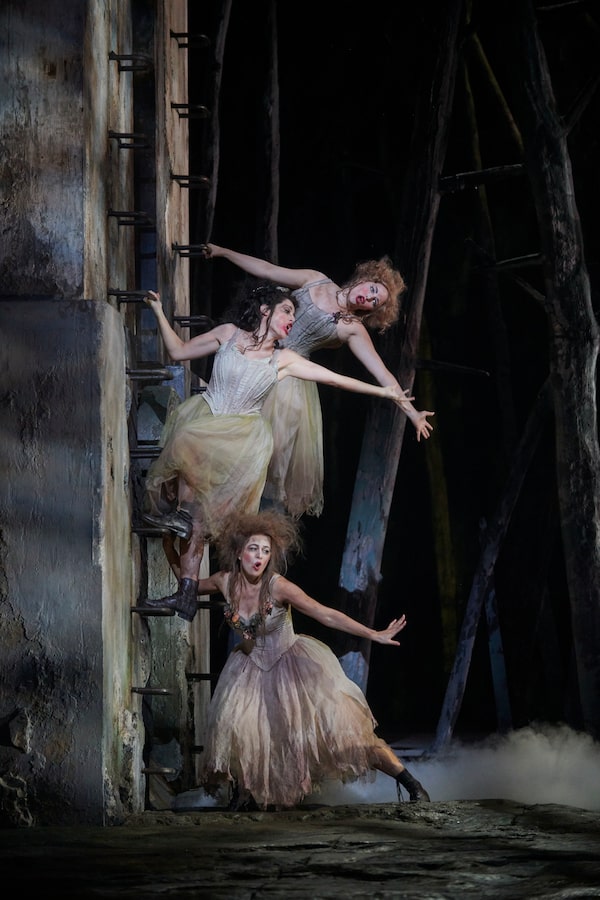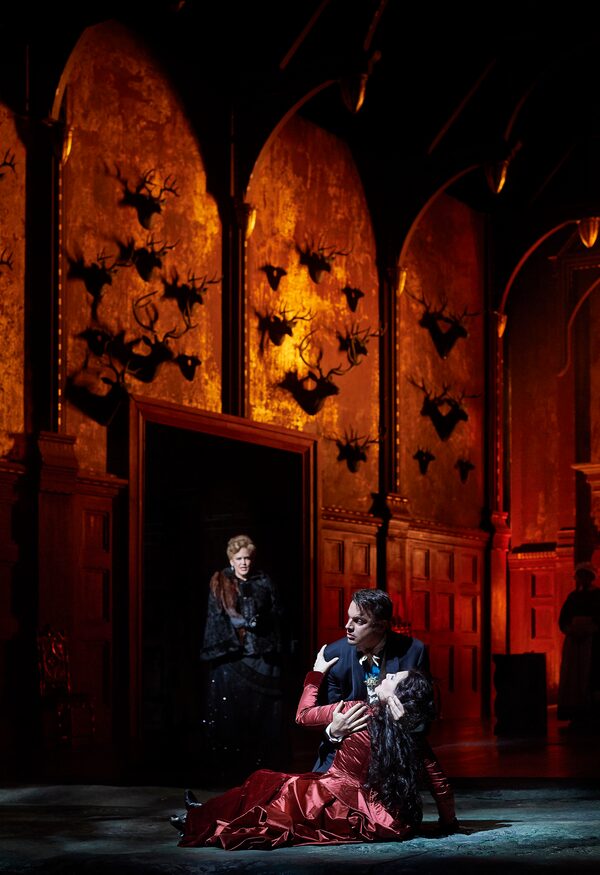
In Rusalka, Sondra Radvanovsky, centre, eases any doubts that her vocal thrill is dependent on the stylistic handouts of Italian bel canto opera.Chris Hutcheson/Supplied
- Title: Rusalka
- Canadian Opera Company
- Venue: Four Seasons Centre in Toronto
Here’s some tragedy for you: Picture Sondra Radvanovsky, the celebrity soprano who’s earned her fame with her extraordinary voice, standing downstage centre of Four Seasons Centre for the Performing Arts, completely mute.
This is no spooky story of a soprano frozen onstage, stunned by stage fright or having forgotten her next line. Rather, it’s a major plot point in Antonin Dvorak’s Rusalka, currently onstage courtesy of the Canadian Opera Company.
No, Rusalka does not spend the entire opera voiceless, only a healthy portion in the middle of the opera, between the water nymph’s losing her voice in exchange for a human body and soul, and her sad return to the water after a failed attempt at earthly love. It’s an engrossing fairy tale, and Radvanovsky is her usual thrilling presence when she does sing. Yet, even with a star onstage, and in the hands of Scottish director David McVicar, this production of Rusalka does not compel.
Much of it is out of McVicar’s hands; the work itself is full of dated “opera-isms,” such as redundant scenes carved into the libretto to give some superficial stage time to the dancers and the chorus. And, in a gross misstep of storytelling, there is too little time for an audience to become invested in the characters’ paths.

Throughout Rusalka, wood-nymphs and water-sprites litter the stage, looking like creatures cobbled together from Swamp Thing, The Ring, and The Threepenny Opera.Chris Hutcheson/Supplied
To save you a Google search, the plot of Rusalka has certain overlap with that more familiar tale of amphibious love, The Little Mermaid. Rusalka, an immortal water nymph, has fallen in love with a human prince, and she wants to become human herself and be with him. She ignores the warnings of her father and instead seeks a magic potion from the witch, Jezibaba, to turn her into a woman. Jezibaba gives her the potion, with strings attached: In exchange for her legs, Rusalka must give up her voice. Worse, if Rusalka does not find love with the prince as a wordless woman, he will die and she will be damned eternally.
It’s worth a pause here, to think of the prince’s first meeting with Rusalka in her freshly human form and wandering silently in the woods: He decides he loves her, kisses her and takes her home, supposedly to marry in the near future. Even if we forget the tired misogyny of a man making a decision on a woman’s behalf, it’s entirely icky to remember that Rusalka is a mute woman with the human social skills of a toddler.
In his staging, McVicar does little to help the weaknesses of the opera, not even in the crucial realm of developing these half-established characters. Wood nymphs and water sprites litter the stage, looking like creatures cobbled together from Swamp Thing, The Ring and The Threepenny Opera. Rusalka’s father, compellingly sung by Stefan Kocan, doesn’t get the gravitas he should bring to the stage, because we’re too busy looking at his frog limbs. Jezibaba is a caricature, like something out of Sweeney Todd, practising scary witch faces in the mirror. The Foreign Princess (sung deliciously by Keri Alkema) actually does have a clear, organic character arc as Rusalka’s competition for the prince’s favour; but McVicar places her too far upstage to really feel the dramatic wallop. And Rusalka, when we should feel sorry for her isolation and confusion, is plagued by a weird gait and meaningless movements that do little but confuse, cheapen and distract from the essential onstage action.

The Foreign Princess, played by Keri Alkema, front, has a clear, organic character arc as Rusalka’s competition for the Prince’s favour.Michael Cooper 2019 coopershoots.com/Supplied
The jury is still out on which offers the better music, Rusalka or The Little Mermaid. Yet, Rusalka is the rarity here, particularly in Canada, where Czech opera isn’t often at the top of the operatic pile. Dvorak is known for his organic, effortless melodies, infused with the nostalgia of Slavic folk music that sounds exotic and comforting all at once.
And to hear Radvanovsky in the title role is equally rare. The star soprano, with a steeliness in her sound that always reminds me of Maria Callas, is known for all things Italian. Her signatures include Bellini’s Norma, Puccini’s Tosca and the Olympic feat that is Donizetti’s The Three Queens. Singing in Czech can certainly offer new vocal colours, and Dvorak’s style has Rusalka singing amid thick orchestration, demanding richness and expression in all corners of her range. And Radvanovsky delivers, easing any doubts that her vocal thrill is dependent on the stylistic handouts of Italian bel canto opera.
It’s hard to say what we’re left with as the curtain falls on this Rusalka. Perhaps with the memory of giant crow men climbing down ladder rungs or the sight of Vodnik’s frog feet. Definitely with renewed appreciation for Radvanovsky’s singing. But tragically, we’re not left with sympathy for the fates of Rusalka nor her prince.
Rusalka runs through Oct. 26.
Live your best. We have a daily Life & Arts newsletter, providing you with our latest stories on health, travel, food and culture. Sign up today.